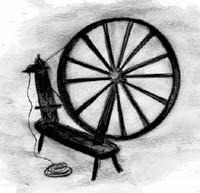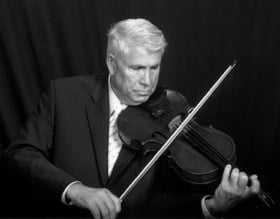An Opera Made for Kids

On Sunday, March 6, the UC Santa Cruz Department of Music will premiere the children’s opera Riddle Me, based loosely on the story of Rumpelstiltskin. In a somewhat modified version of the fairy tale, librettist Claudia Stevens has retold the story in a modernized, upbeat version. According to the description: “The boastful father is recast as a competitive mother who seeks to enlarge herself through her daughter’s accomplishments. The king becomes the villain of the story — a bully who is brutal, false, and greedy. The dwarf — called Riddle in the opera — is not wicked but a mysterious, magical, not-quite-human, creature from ancient times. Riddle is the last of her kind, and she has come to remind Rowena, and us, of the meaning of friendship, acceptance of difference, self-sacrifice, and loyalty.”
UC Berkeley composer, teacher, and performer Allen Shearer composed the opera. He says: “[Director] Brian Staufenbiel regularly produces operas for young audiences at UC Santa Cruz, and he invited Claudia and me to collaborate with him on this project.” Accompanying the student vocalists is a quartet of instruments: violin, clarinet, cello, and piano. “If the music is somewhat lighter than what I would write for a seasoned new-music audience, it is because the story elicits those moods,” says Shearer. “It has its dark moments, too, where dissonance is not spared.” With the shorter running time of 40 minutes, this free performance is a wonderful introduction to contemporary opera.
See details here.
An Educator Stands Out

The California Music Educator Association Bay Chapter honored Thomas Tatton with the Outstanding Music Educator Award in January 2011. This life-time achievement award recognizes Tatton’s 40 years of service as an educator — in the Lincoln Unified School District, at University of the Pacific in Stockton, and at Whittier College. Still active as an adjudicator, lecturer, and writer, Tatton has conducted clinics and youth orchestras in North America, Canada, South Africa, and several European countries. He’s also an active violist, and recently recorded the six Bach cello suites on viola.
Tatton performed on “Viola Mania” at the Freight and Salvage in September 2010, where he was recognized before hundreds of viola-toting peers with a surprise award. He was vice president of the International Viola Society and president of the American Viola Society, and still serves on their board. Says Tatton, “What I’ve done is to share my love of music with kids. It’s been a wonderful journey of enriching lives and raising the level of culture in our society, one child at a time. If you’re in the profession, you give and share—that’s just what you do. It’s a great profession!”
Spring Time Is Audition Time

Photo by Marshall Pierce
Spring is the season for auditions and the most prepared candidate is sure to be the most successful. Kids may be considering attending their first summer music camp, or joining one of the many fantastic youth orchestras and choirs in our area for next fall. In order to help them, it’s important to do your research now to learn about what ensemble might be the best fit for your child, and the relevant audition deadlines and requirements. A good place to start is with SFCV’s Bay Area Music Groups, and search by Youth Ensembles. It’s also time to think about summer camp signups, and some may require an audition to get in (stay tuned for our coming article on summer camps).
Youth orchestras and choirs often hold auditions in May, for placement for next fall. Many orchestras require applicants to play scales, contrasting movements of a concerto and orchestral excerpts, all of which is detailed on their Web sites. Taking the next few months to become familiar with the orchestral repertoire required (not just those small excerpts!), and polishing up solos is a good idea.
As expert Dana Fonteneau advises, preparation is the best way to fight stage fright; read more on that here. Private teachers and school music teachers can help select audition repertoire that is right for your child’s ability level. Choir auditions may consist of singing a prepared piece, matching pitches or sight-reading music, depending on the child’s level. Some ensembles hold auditions throughout the year, others only in the spring or summer. It never hurts to attend spring concerts by your favorites, to hear what it’s all about!
Visit our Audition Directory. And, be sure to contact individual groups as well, as all of their information may not yet be included in our database.

